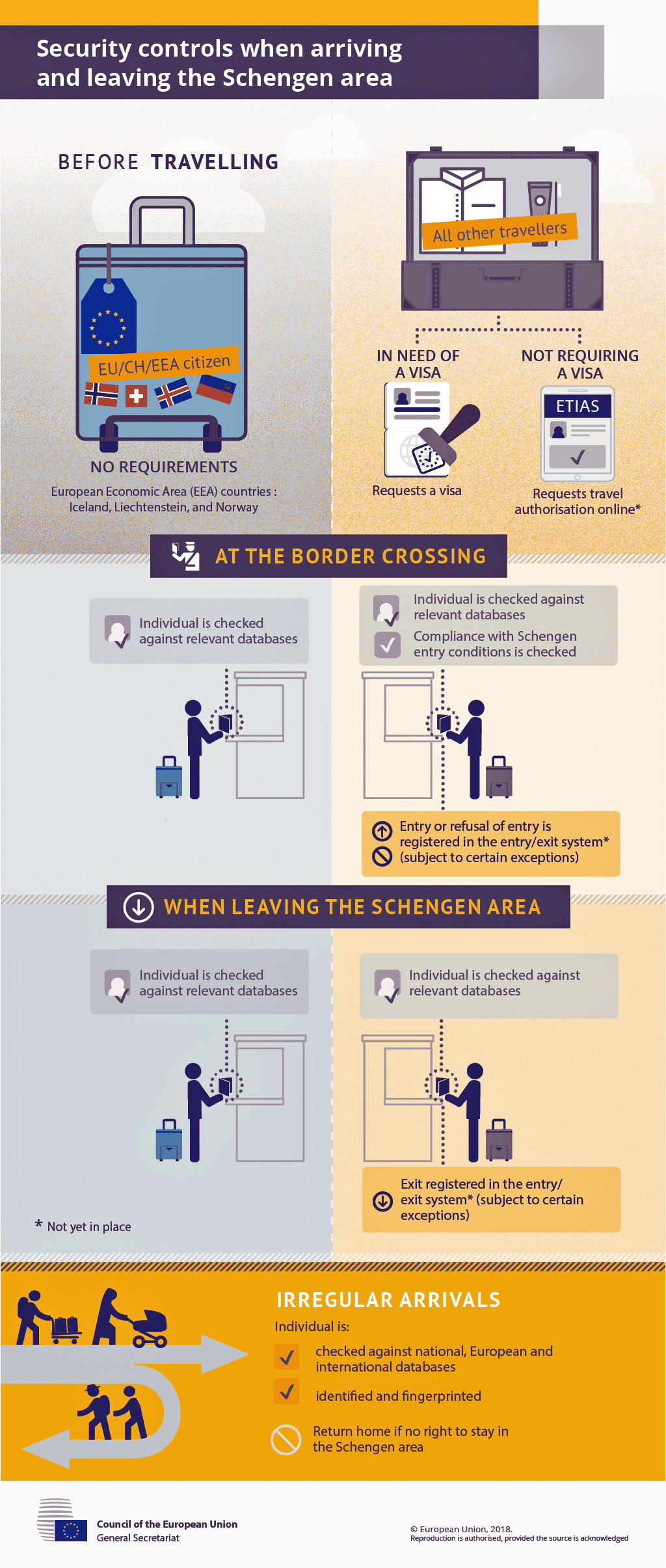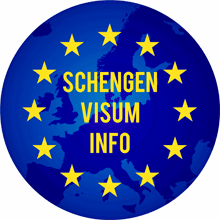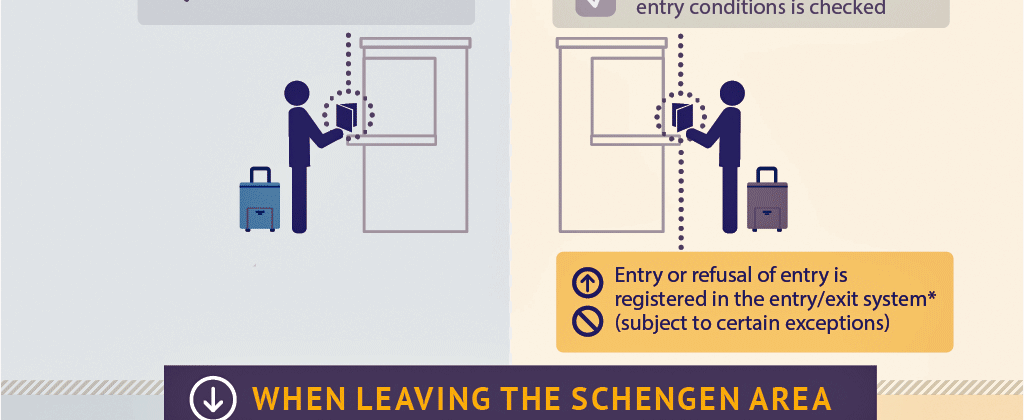ETIAS travel authorization for visa-exempt travelers
On 5 September 2018, the European Council adopted a regulation establishing a European travel information and authorization system (ETIAS). This system should prevent that visa-exempt travelers that pose a threat to public order, national security or the international relations of the Netherlands or one of the Schengen countries can travel to the EU.
When a person from outside the EU to a Schengen country If you want to travel there are two options:
- The travelers are visa required and must first apply for a visa at an embassy or consulate (Short Stay Visa type C, also known as a Schengen visa).
- The traveler is visa-free but must be able to present the correct travel documents at border control.
ETIAS: Control who enters the EU
Detailed information about potential visitors, including biometric data, is collected during the Schengen visa application process. There is no such information on visa-exempt third-country nationals.
Currently, there are 63 countries and territories whose nationals do not require a visa to travel to the EU. According to the European Council, this is undesirable in view of the increased risk of terrorism and crime. That is why the EU has decided to set up a European Travel Information and Authorization System (ETIAS).
This system allows the EU to collect specific information on visa-exempt travelers before they arrive at the external borders of the Schengen area. Visa-free travelers must then request prior permission (travel authorisation) to enter the EU.
Anyone who poses a risk to, for example, safety or public health will not be granted travel permission. Even with a valid travel authorization, the traveler does not automatically have the right to enter and stay in the Schengen area. Ultimately, the Royal Netherlands Marechaussee, which is responsible for border control, takes a decision on this.
The European Travel Information and Authorization system (ETIAS) can be compared to similar systems in the US (ESTA), Canada, Australia and other countries. The travel authorization for the EU must be applied for online, applicants over the age of 18 will pay a fee of €7.
The European Travel Information and Authorization System (ETIAS) will become operational in mid-2024. ETIAS will then apply to 63 nationalities who can now travel visa-free to Schengen/EU. It is not yet known whether holders of an ETIAS are also required to have one medical insurance have to close for their trip to Europe.
Read more about ETIAS
Below you can read more articles about ETIAS:
EU: COVID-19 has no impact on ETIAS launch date
The benefits of ETIAS, the new visa exemption for Europe
Frequently asked questions and answers about ETIAS (FAQ)
Read below frequently asked questions and answers about the European Travel Information and Authorization System (ETIAS), which will be introduced in mid-2024.
ETIAS is the European travel information and authorization system. From the introduction of ETIAS, nationals of 63 third countries who want to travel to the EU and who do not require a visa must first apply for a travel authorization in order to travel to the Schengen area.
ETIAS aims at the security checks of non-EU citizens who enter the country without a visa Schengen area better control of travel, which contributes to:
– a high level of security;
– the prevention of illegal immigration;
– protecting public health;
– more effective border controls;
– the objectives of the Schengen Information System;
– the prevention, detection and investigation of terrorist offenses or other serious criminal offences.
ETIAS will also apply to the Netherlands.
ETIAS is an automated IT system for identifying security or illegal migration risks posed by visa-exempt travelers traveling to the Schengen area, while respecting fundamental rights and data protection. It is developed by eu-LISA and should be operational in 2024. Non-EU citizens who do not require a visa to travel to the Schengen area must apply for a travel authorization (ETIAS) prior to travel. After completing an online application form, the system carries out checks against EU information systems for borders and security.
Yes, the Electronic System for Travel Authorization (ESTA) is a security measure that allows the United States government to deny unwanted travelers before boarding an aircraft or ship bound for America. The ESTA is therefore very similar to electronic travel authorization programs of other governments, such as the eTA for Canada, the eVisitor visa for Australia and ETA for Sri Lanka. Worldwide, more and more governments are adopting a system similar to ESTA as a replacement for visa stickers and/or visa-free travel. ETIAS is similar to ESTA.
No, an ETIAS authorization is not a Schengen visa or any other type of visa. Nationals of countries subject to visa liberalization will still be able to travel to the EU without a visa. They must first apply for a travel authorization via ETIAS before they travel. ETIAS will be a simple, fast and user-friendly system: in more than 95% of cases, a positive answer will be received within a few minutes. The ETIAS travel authorization remains valid for three years, much longer than a Schengen visa. An ETIAS travel authorization is valid for an unlimited number of entries. ETIAS does not affect the visa exemption that already applies to many countries. ETIAS makes it easier to cross the Schengen external border and offers people who are allowed to travel visa-free the opportunity to take maximum advantage of the visa exemption.
The system applies to third-country nationals who are exempt from the visa requirement. Travelers must complete an application online on a dedicated website or mobile app. The applicant only needs a travel document (passport or equivalent) to complete the form. Completing the application will take no more than 10 minutes. Every applicant between the ages of 18 and 70 must pay an electronic fee of 7 euros. The automated review will begin once payment of the fee has been confirmed. The vast majority of applicants (expected to be over 95% of all cases) will automatically receive a positive response within minutes of their payment.
The travel authorization is valid for three years (or until the expiry date of the travel document). The traveler therefore only needs to apply for a travel permit once every three years. The issued permit has no restrictions on the number of trips. However, the normal regulation of a maximum stay of 90 days in the EU of the third-country national applies.
If the travel authorization is refused, the applicant can (still) lodge an appeal. He can appeal in the Member State that took the decision on the application. The national legislation of that Member State applies. The applicant will be informed of which national authority was competent to process the application and decide on it, as well as information on the procedure to follow if they wish to lodge an appeal. If the traveler believes that he has been treated unfairly, he can also seek redress or request access to the information through the national authority.
Yes, travel authorizations remain valid for three years, but can be revoked or voided if the conditions for issuing the travel authorization are no longer valid.
The ETIAS legislation will apply to Member States that are part of the Schengen area, but also to Member States that do not yet fully apply the Schengen acquis (such as Croatia, Cyprus, Bulgaria and Romania).
ETIAS is expected to be operational in May 2024.

Related articles:





